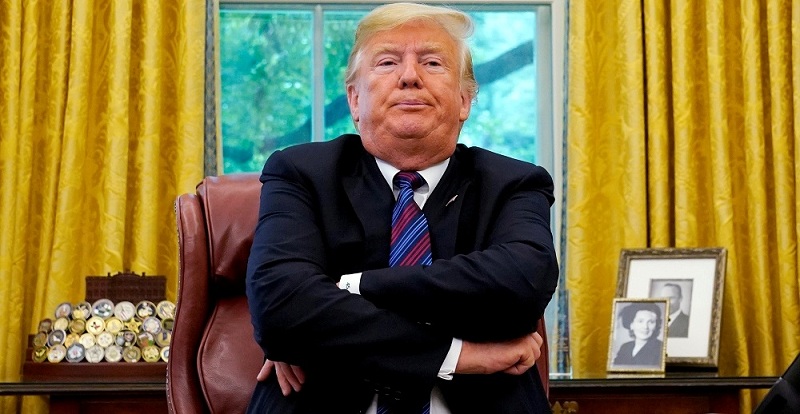Alwaght- Infighting in US administration is continuing on cutting or preserving Iran's access to SWIFT global payment network, ahead of the implementation of new economic sanctions against the Islamic Republic in November.
Multiple American officials, who spoke to the Washington Free Beacon news website on Monday, said an internal battle was being fought inside the US administration in Washington to save Iran's access to international financial markets and provide Tehran with a critical lifeline in advance of the looming sanctions.
Leaders of the SWIFT banking system held meetings with US officials last week to make sure Tehran retained its access to the international banking system after Washington's unilateral withdrawal from Iran nuclear deal in May.
US President Donald Trump and some other officials have, however, made clear that SWIFT and European countries should end their business with Tehran in a bid to put maximum pressure on the Islamic Republic.
"President Trump instructed the administration to restore all of the sanctions from the Obama era and then some, because that's what maximum pressure means," said one US official who works extensively on Iran policy.
"During the Obama era, SWIFT disconnected Iran due to sanctions threats," the official added. "There are people inside the administration who think they can convince the president to be weaker on Iran than Obama was. That's a bold strategy. Let's see if it pays off for them."
Senators Ted Cruz of Texas and Tom Cotton of Arkansas – both outspoken anti-Iran lawmakers – told the Washington Free Beacon that the Congress would not go along with efforts to protect Iran's financial access despite pressure from some inside the Trump administration.
"Ultimately, SWIFT and the Europeans must choose between doing business with the United States or Iran," a Cotton spokesman said. "Those attempting to use a creative backchannel to facilitate commerce with Iran would do well to remember that the $19 trillion US economy dwarfs Iran's.”
Cruz warned European allies and SWIFT leaders – which includes US-based banks JPMorgan and Citibank – that Congress would not hesitate to sanction any institution or government that violated the new US sanctions on Tehran.
"In July, Senator Cruz and nine fellow senators sent a letter to European ambassadors emphasizing that sanctions like the ones regarding SWIFT are the result of congressional statutes, and Congress expects our allies will comply with them," a Cruz spokesman told the news website.
"In August, he and 15 fellow senators sent a letter to the Treasury Department emphasizing the importance of enforcing SWIFT-related restrictions, because otherwise the President's maximum pressure campaign will fail," the spokesman said. "Everything that's happened since then has confirmed those positions."
One former sanctions official who worked extensively on the Iranian portfolio told the Free Beacon that while some may be angling to save Iran's access to SWIFT, it remains mostly in the president's hands.
"It's basically up to the president at this point," said the former official, who would only speak on background. "There's a big push by SWIFT to get opinion leaders to side with Iran and Europe, but Trump knows how weak he will look if he doesn't get them to disconnect. He can't have a policy weaker than Barack Obama's for crying out loud."
The US Treasury Department has yet to comment on the matter.
Trump announced in May that Washington was pulling out of the nuclear agreement, officially known as the Joint Comprehensive Plan of Action (JCPOA), which lifted nuclear-related sanctions against Tehran in exchange for restrictions on Tehran's nuclear program. The deal had been signed between Iran and the five permanent members of the UN Security Council -- the United States, Britain, France, Russia and China -- plus Germany in 2015.
A first round of American sanctions took effect in August, targeting Iran's access to the US dollar, metals trading, coal, industrial software, and auto sector. A second round, forthcoming on November 4, will be targeting Iran’s oil sales and its Central Bank.
The Trump administration is pushing on all buyers of Iranian oil to cut imports to zero. But Iran, OPEC’s third-largest producer, has repeatedly announced that its oil exports cannot be reduced to zero because of high demand levels in the market.
Iran has vowed full-throttle oil production despite US sanctions, with Vice President Es’haq Jahangiri saying earlier this month, “Notwithstanding all the pressures that the Americans are creating on the oil issue, Iran has its own oil customers, and the work is going on in a way that no problems will arise.”
President Vladimir Putin has said Russia is prepared to continue its oil investment in Iran at the level of $50 billion despite the re-imposition of the sanctions.
The Iranian Foreign Ministry said last week that India was committed to buying Iranian oil and continuing the two nations' economic cooperation despite US-imposed sanctions.



























